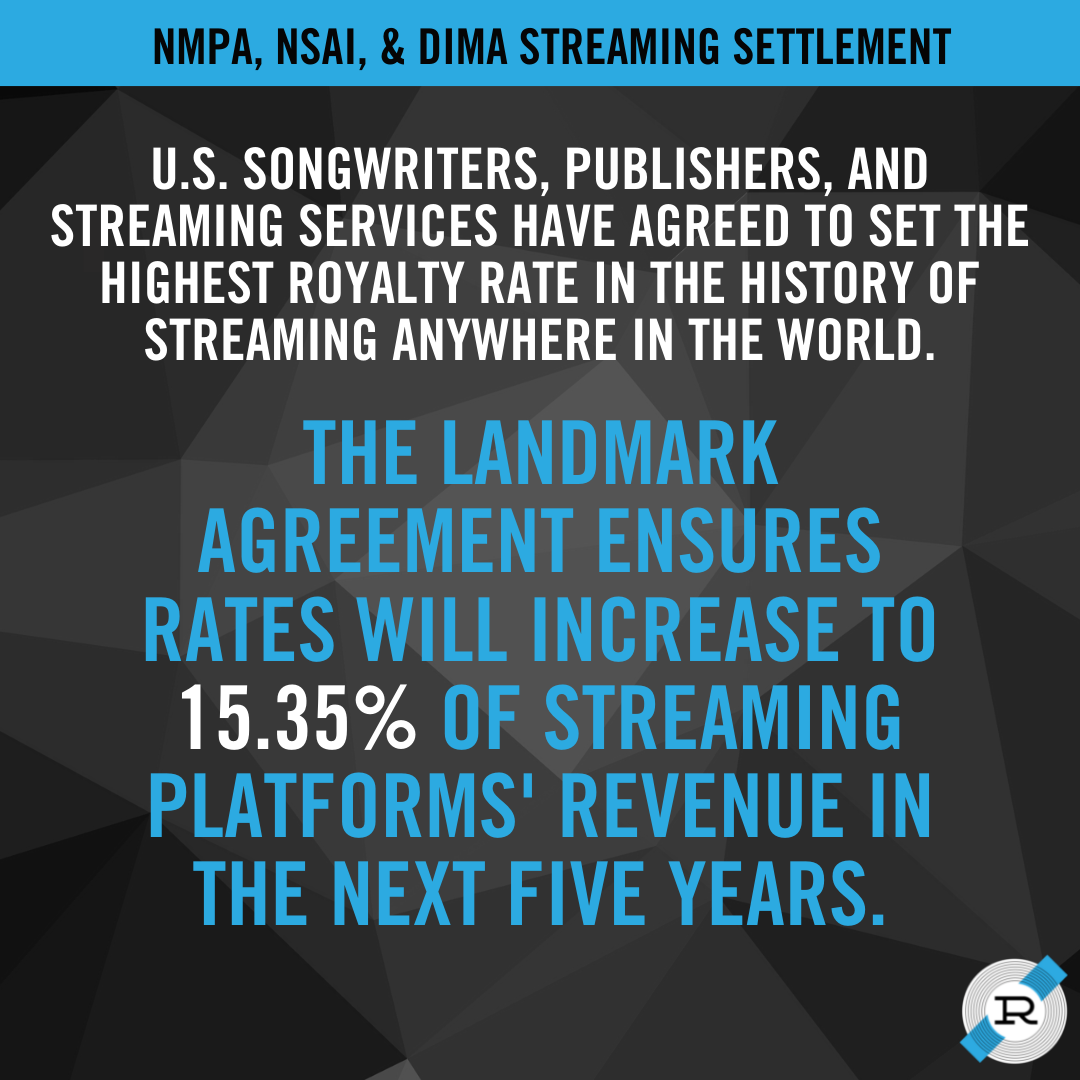RESERVOIR COMMENDS LANDMARK MECHANICAL STREAMING ROYALTY RATES SETTLEMENT
Date:
The National Music Publishers’ Association (NMPA), Nashville Songwriters Association International (NSAI), and Digital Media Association (DiMA) Have Reached a Settlement for Mechanical Streaming Royalty Rates to Increase to 15.35% over the Next Five Years
Reservoir Media, Inc. (NASDAQ: RSVR) (“Reservoir” or the “Company”), an award-winning independent music company, today commended a landmark settlement reached between the National Music Publishers’ Association (NMPA), Nashville Songwriters Association International (NSAI), and Digital Media Association (DiMA) in relation to the U.S. Copyright Royalty Board’s (CRB) Phonorecords IV proceedings. Digital service providers (DSPs), including Amazon, Apple, Google, Pandora and Spotify, have agreed to incrementally raise the percentage of revenue they pay songwriters and publishers to 15.35% over the next five years, beginning in 2023. The settlement has established the highest mechanical streaming royalty rates in the history of streaming music anywhere in the world.
Historically, every five years the CRB sets the mechanical streaming royalty rates to be paid to songwriters and publishers. The NMPA has consistently advocated for the CRB to increase those rates to compensate creators more fairly for their significant contributions to the industry. Since 2019, the songwriting community and its advocates have been mired in ongoing litigation surrounding an appeal by several DSPs against the rates set by the CRB III decision in 2018. However, in July 2022, the appellate decision marked a significant win for music creators, reaffirming the original 2018 decision to incrementally increase rates from 10.5% to 15.1% through 2022.
Starting in September 2022, the CRB was set to conduct the next trial, known as CRB IV, aimed at establishing mechanical royalty rates for the five-year term beginning in January 2023. Instead, the settlement avoids a costly trial and establishes a hopeful precedent for future rate setting and further collaboration between rights holders and the DSPs.
As the streaming industry continues to grow, the incremental rate ensures that songwriters mutually benefit from the popularity of these platforms. In addition to the increased mechanical streaming royalty rates, the settlement addresses several other terms from CRB IV. Notably, the deal includes significant improvements in the alternate rate structures, which act as insurance for songwriters. These improvements include raising the per subscriber penny rate and raising the Total Content Cost (TCC), which guarantees a percentage of what record labels are paid will be distributed to songwriters and publishers. The settlement also outlines a better treatment for “bundles,” which combine music products with other offerings. Each facet of the settlement provides important safeguards for songwriters and publishers in the context of the dynamic streaming industry.
Reservoir Founder and Chief Executive Officer Golnar Khosrowshahi, who is also an NMPA Board Member, commented, “This settlement is a truly historic moment for songwriters and music publishers. We are so grateful to David Israelite and the NMPA team for their continued advocacy for music rights holders and their consistent efforts towards achieving fairer rates for the songwriters who keep our industry alive. We are hopeful this settlement will usher in a new era where we can better compensate and recognize our creators for all they contribute, while partnering with streaming platforms to create a fairer and more fruitful music business.”
NMPA President and CEO David Israelite said, “This historic settlement is the result of songwriters making their voices heard. Instead of going to trial and continuing years of conflict, we instead move forward in collaboration with the highest rates ever, guaranteed. We thank the digital services for coming to the table and treating creators as business partners. Critically, since this is a percentage rate, we know that as streaming continues to grow exponentially, we will see unprecedented value of songs.”
